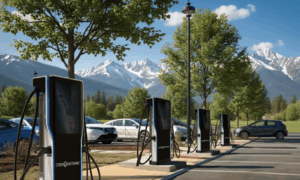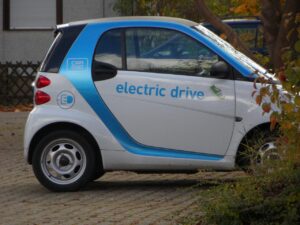
Home / EV Charging News / Electric Cars and Rural Electrification: Driving Sustainable Transformation in Remote Communities
In the pursuit of a sustainable future, the spotlight is turning towards rural electrification, where electric vehicles (EVs) are emerging as catalysts for change. This article explores the transformative role of electric cars in extending access to clean and sustainable transportation options in remote and underserved areas.
Rural and remote regions often grapple with transportation disparities, marked by limited access to public transportation and vast distances between communities. This poses environmental challenges and hampers economic development, highlighting the need for innovative solutions.
Electric vehicles present a promising solution to address transportation disparities in rural areas. Beyond their lower carbon footprint, EVs offer cost-effective and accessible transportation options, promising economic benefits for these communities.
Electric cars, known for their environmental friendliness, can significantly reduce air pollution and greenhouse gas emissions in rural regions. Beyond the environmental impact, the adoption of EVs can bring economic advantages to rural communities, such as reduced fuel costs and potential job opportunities within the growing EV industry.
Developing a robust charging infrastructure is a crucial challenge in rural electrification through electric cars. Strategic placement of charging stations and innovative solutions like solar-powered charging can make EVs viable in remote regions, where limited grid connectivity is often a hurdle.
Government initiatives play a pivotal role in promoting electric cars for rural development. Subsidies, tax incentives, and infrastructure investments can accelerate the adoption of EVs. Collaborations between governmental bodies, EV manufacturers, and renewable energy providers further enhance the prospects for sustainable rural transportation.
Education and awareness programs are essential to overcome skepticism and myths surrounding electric cars in rural areas. By informing communities about the benefits, cost savings, and environmental advantages of EVs, acceptance and adoption can be facilitated. Training and skill development programs also empower individuals to participate in the maintenance, charging station management, and even potential manufacturing of electric vehicles.
Looking ahead, the journey towards sustainable rural transportation involves unlocking the full potential of electric vehicles. As advancements in technology continue, the resilience of EVs to navigate challenging terrains and their adaptability to local needs become increasingly evident. The electric mobility revolution has the power to redefine how rural communities perceive and engage with transportation.
In addressing the unique challenges of rural electrification, innovative solutions are emerging. Beyond traditional charging infrastructure, technologies like portable charging stations and battery-swapping services are gaining traction. These innovations cater to the realities of remote areas, ensuring that electric cars remain a feasible and convenient option for residents.
Electric cars present an opportunity for local economic empowerment. Beyond the potential for job creation in maintenance and charging station management, there’s the prospect of community involvement in the EV industry. Supporting local initiatives, such as community-owned charging stations or electric vehicle fleets, can further enhance the economic impact of sustainable transportation in rural areas.
The adoption of electric vehicles aligns with broader efforts towards environmental stewardship in rural regions. Beyond the immediate reduction in air pollution, rural electrification through EVs fosters a culture of sustainability. It encourages communities to explore renewable energy sources and adopt eco-friendly practices, contributing to the overall well-being of both the local environment and its inhabitants.
The versatility of electric vehicles extends beyond daily commuting. In rural areas prone to natural disasters or emergencies, electric cars equipped with bi-directional charging capabilities can serve as mobile power hubs. This not only enhances community resilience but also provides a lifeline during times of crisis, showcasing the multifaceted benefits of EVs in remote regions.
As the world collectively embraces sustainable practices, the success of rural electrification through electric cars relies on global collaboration. Shared knowledge, best practices, and technological innovations can accelerate the integration of EVs into rural landscapes worldwide. Collaborative efforts can pave the way for a network of interconnected rural areas that share insights, solutions, and collectively contribute to a sustainable and resilient global future.
In conclusion, the integration of electric cars into rural electrification marks a significant step towards creating greener and more sustainable rural communities. Beyond addressing transportation challenges, EVs become catalysts for economic growth, environmental stewardship, and community resilience. As technology evolves and global collaboration strengthens, the road ahead holds the promise of a tomorrow where rural landscapes are not only connected by sustainable transportation but also empowered to thrive in harmony with the environment.



